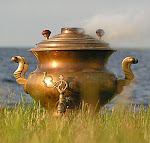Start all the clocks!
Hook up the telephone!
Allow the dog to bark without a juicy bone!
Hmmm... Anybody have a really joyful birthday poem? Please let me know, I’d like to read it the next time I’m at a birthday gathering in honor of a beloved person no longer with us.
Joseph Brodsky was not just the poet and co-founder of the Russian Samovar who would have turned 70 this past Monday, May 24th. He was the man who claimed that the rise of free thinking in the Soviet Union began not with Solzhenitsyn's One Day in the Life of Ivan Denisovich, but with the series of Tarzan movies that were part of the cache of "trophy films"captured by the Soviets in WWII and subsequently screened all over the USSR. Who authorized that, I’d like to know?! If you have a fresh look at those films, as I have and recommend you do, you may see that they are an object lesson in rejecting the norms of society, retreating to one's individual paradise, living for the present, and returning meaning to language. Johnny Weismuller, as Tarzan, wastes no words: “Jane swim now!” he says. And, of course, "Uhhhh-ee-uh-ee-uhhh-ee-uh-ee-uhhhhhh! (hear it here) as he swings through the air from vine to vine.

Tarzan’s was one lesson Brodsky took to heart. He quit school, went on expeditions to god-forsaken places, devoured every poetic influence he could get his hands on, chased girls, got in trouble with the law, did hard time, emigrated to the United States, taught at Mount Holyoke, became a New Yorker, married a princess, and frequently brooded or laughed in the back corner of the Samovar with friends from all over the world. All while writing poetry and prose, some of which will surely stand the test of time and continue to be read and enjoyed as long as people still do that sort of thing.
On Monday night, the tribute to Brodsky came in poetic and musical forms, from the sound of his own voice recordings to new and old translations of Shelley and Auden, to music by Grieg and Schumann and Bloch. Two Davids, Lehman and Rieff, said neat things about Brodsky. Sunny von Bülow, poor thing, looked in briefly as a mute shade. Vasily Kolchenko performed his own lovely setting of Brodsky’s early “Воротишься на родину” [You come back to your homeland] for bard and acoustic guitar. And with that, more or less, everybody headed upstairs to remember Brodsky in more gustatory fashion. O, the kulibiak (a long pastry filled with cabbage, meat or fish)! O, the shining vodkas and non-alcoholic cranberry drinks! O, the kilometers of salads of every shape, color and form! As Hamlet may or may not have said, depending on which folio we go by, and meaning precisely what, we know not/naught, “O, o, o, o!”

